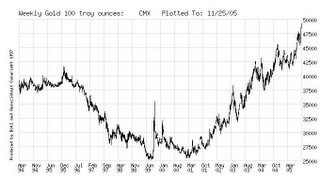
Shame on
Forbes.
The November 14th, 2005 issue had an article titled,
We’re Not That Dumb written by Michael J. Handel of the Economic Policy Institute. (Again, try
bugmenot if you can't get that article.)
I am going to dissect this incoherent tripe.
First, the subtitle,
Our economic ills are supposedly due to a gap between workers' skills and job demands. That gap is a myth.Now exactly what are “
our economic ills”? Handel doesn’t say. About halfway through, I can only infer “
rising wage inequality” with ZERO supporting evidence. But it’s not a good start when the reader has to guess the subject at hand.
Handel then says:
Fed Chairman Alan Greenspan has repeatedly said that U.S. workers need to beef up their skills and training if they want to compete globally in this era of technological innovation. President Bush proposes education policies based on the assumption that the quality of schools is sliding inexorably downward.Okay, I don’t want to include too much of this article on my blog. It was painful enough to read it myself and the link is above for those so inclined. But I wanted to illustrate a common
Moron debating tactic.
First, Handel makes a broad-brushed statement of our nebulous “
economic ills” and then tries to link that to an equally vague notion, in this case a “
skills gap”. Now this masturbater, I mean MASTER DEBATER sets off to debunk the “
myth”.
Of course fueling these “
ills” and the “
myth” are two major enemies to socialism, Alan Greenspan and President Bush. A little background – the Economic Policy Institute is a Commi-propaganda think tank which I recognized right away but which could easily be missed by an undiscerning reader.
I fully understand the limits of space in penning an article such as this, but this is ridiculous. The first paragraph almost epitomizes the word propaganda. Handel is trying to suck the reader into a syllogism that he created out of thin air. Whatever our unnamed “
economic ills” are, you can be sure that President Bush and Alan Greenspan are complicit. Nine out of ten people on the street will tell you that government schools are “
sliding downward”. Only a elitist ideologue can dismiss that reality and I will get to the ideological bias later.
It is quite a leap from one Greenspan quote about workers needing to “
beef up their skills” to a “
wage gap” and then to our unnamed “
economic ills”. But such is common practice amongst the
Morons who start with ideological conclusions and then scamper to create the supporting evidence. And for good measure, this faux evidence usually impugns as many enemies of the
Moron as possible, e.g Bush and Greenspan. Hey why not - it is all made up anyway?
It is almost impossible to debate a guy like this because he made no connection from our unnamed “
economic ills” to his whacky construct of a “
skills gap”. But like most of the
Morons, I can even
Marginalize this guy by assuming his misbegotten premise.
For the sake of argument, I will accept that we have some economic problems caused by deficiencies in workers’ skills. Handel proceeds to attacks this "
myth":
In the early 1960s nearly 50% of all Americans had dropped out of high school, including nearly one-third of young adults. Today both figures are under 15%. Four-year college completion rates for young workers doubled from 15% to 30% over the same period. In fact, Americans are more educated now than ever before.
So why the concern with education? Scores on college entrance exams like the SAT and ACT did decline between the mid-1960s and the early 1980s. For much of that time the U.S. economy was also in recession and faced a withering challenge from the apparently better-educated Japanese. This began what is now a tradition of blaming education for economic problems. (This last sentence is a doozy. I must have forgotten about our BLAME EDUCATION DAY. It is actually not a bad idea.)So more kids graduate from high school and more go to college than 40 years ago. Big deal. How the heck does this imply that kids are entering the workforce today with no gap between their skills and what an employer needs? The great majority of people that I know will freely admit that they hardly use their college education at all on the job.
Furthermore, hasn’t high school education been dumbed down to the point of being a joke? For crying out loud, today students can take 12 years of ESL courses (English as a Second Language) and still earn their diploma. I would STRENOUSLY ARGUE THAT NOT BEING FLUENT IN ENGLISH IS QUITE A SKILLS GAP!!!!!!!!!!!!!!!!!!!!!!!
Aha – now I get it. What Handel really wants to say is that our educational system is good – which is quite off-topic from the still unnamed ”
economic ills” and not to mention, quite a stretch of the imagination.
High schools are so deficient today that kids (their parents and taxpayers) have to spend 100k on college just to become literate now. Yet Handel somehow sees this increased college enrollment as a validation of our public educational system? Please Mr. Handel, come back to Earth. Actually I think Handel’s idiocy is irreparable. Clearly he has that dominant 2+2=5 gene so apparent in blind ideologues.
Handel then predictably steps in the excremental SAT propaganda.
Let's set the record straight. Since the early 1980s scores have remained level or climbed, depending on the test. Math SAT scores are higher now than they were in the early 1970s.Sorry
Moron, this isn’t evidence of a solid educational system either. As he himself already stated, there has been a significant increase in college matriculation and therefore a much greater percentage of students are taking the SAT. Before, only the smartest kids took the SAT, now plenty of the dummies are also taking it.
SO SHOULDN’T AVERAGE SAT SCORES BE LOWER TODAY THAN IN THE PAST?!?!?!?!?!?!?!?
Of course they should be lower. I am going to fill everybody in on a dirty little secret.
THE SAT IS A SCAM.
They have been gradually inflating the scores for the last fifteen years at a minimum. Today a score of 1300 is just not comparable to 1300 when I took the exam in 1990-91. According to this
link, the average SAT score in 1990 was 1026 and in 2004 it was 1049. Now that may not look significant but look at this steadily rising trend in average math scores.
1990 - 521
1992 - 521
1994 - 523
1996 - 527
1998 - 531
2000 - 533
2002 - 534
2004 - 537
You know, all of these public companies get in a heap of sh*t for accounting gimmicks that smooth out their reported earnings or revenue. Yes, I am accusing the College Board of deliberately inflating students' scores.
I couldn't find any historical data on the percentiles but I would bet my right arm that if 1300 was a 94th percentile score (meaning better then 94% of the other applicants' scores) in 1990, I bet it is down nearer the 87th percentile in 2005. You see, they are making the test easier, but the smarter kids benefit more from easier questions than the other students. They have all sorts of skews in there as well to try and blunt this effect, but they can only do it so much. For instance, a student may get only one question wrong on the math part, lose 30 points, and be scored at 770. But the student who gets 10 questions wrong won't lose points proportionally. In other words, he will be penalized by less than 10 * 30 points and score above 500.
IT IS NOT A STANDARDIZED TEST at all because scores are clearly not comparable from year to year. I guess all that matters is your percentile score.
Why inflate the scores? Well, they simply do it to make nice with everybody. Colleges love to tout each incoming class' higher average SAT than the prior year's. Educrats and Big Government advocates like Mr. Handel hunger for contrived statistics to hide the deficiencies of public schools. In short, society just prefers feel-good pabulum over the cold hard facts.

(Coach Thompson and star "graduate" Patrick Ewing who freely admits his illiteracy.)
By no means am I the only SAT critic. Coach John Thompson famously walked off the basketball court sixteen years ago to protest the SAT as "culturally biased". I remember his one example. He said:
"How is a minority from the inner city going to know what a 'yacht' is?"
I don't know John....maybe if they read it in a book. I never saw a yacht in central Massachusetts when I was growing up either. Libraries seem to be free in every locale that I have visited.
Seen as the end-all gateway to higher education, the SAT invites criticism from a multitude of angles beyond Thompson's ridiculous argument. Coach Thompson just didn't want his freshmen declared athletically ineligible because they couldn't score 700 or whatever the proposed minimum was.
Minorities don't score well ergo the SAT is racist.
Women lag men ergo the SAT is sexist.
The SAT is a poor predicter[sic] of college grades....Historically the test did a particularly poor job of predicting how females, students of color, and older test-takers will perform in college.
(All that from a website devoted to bashing the SAT and advocating colleges to stop requiring it.)
My wife wanted to add "football player" to that list of demographics that perform poorer on the SAT than they do once in college. Now here is the burden of humoring and debunking Moron arguments - once you start, you keep encountering more and more sophistry that needs to be taken out.
Why do many kids do poorly on standardized tests and then seemingly do better in college?
BECAUSE THEY MIGRATE TOWARDS THE EASY SUBJECTS!!!!!!!!
While at UPenn, I witnessed firsthand kids who struggle in Economics, Calculus, Engineering, and Pre-Med courses and then take mad dashes into the departments of Psychology, Sociology, Spanish, English, and the joke fields of Afro-American and Women's studies.
So they blow on standardized tests but excel in "all A's and B's", "there are no wrong answers" fluff majors. This "poor predicter[sic]" argument is another standard Moron tactic - Selective Metric Fishing.
The whole point of standardized testing is to objectively and fairly measure all students. These joke fields abominate that end. Did I mention that Michael Handel is a sociologist? I know, what a shocker.
Okay, so the Moron has made neither a coherent nor trenchant case for our educational system yet feels sufficiently content to move on.
What about rising wage inequality? Many labor economists think the spread of computer use to the broader workforce explains most of the change, especially between college- and high-school-educated workers.
Then he rambles on about how computers aren't that important or difficult to use. But wait a second, what about "rising wage inequality"? Handel doesn't bother to source this AND apparently expects readers to sheepishly nod in agreement of both its existence and depravity. CaptiousNut has already debunked its wickedness in a previous blog.
The Gini coefficient measures wealth inequality in a given society. In this country, it has been rising steadily for 30 years – implying a widening gap between the richest and poorest. Propagandists love to pounce on this stat to show how “unfair” capitalism is, yet countries with narrower gaps (lower Gini coefficients) suffer higher unemployment, lower growth, and lower standards of living. SOCIALISTS JUST CAN'T COMPREHEND THE FACT THAT THE EXISTENCE OF VERY RICH PEOPLE IS A GOOD THING FOR THE REST OF SOCIETY.
Moron Handel glosses over that crippling salient, as would any other devout socialist.
I apologize for the redundancy, but again Handel tries to elevate a dubious notion of "rising wage inequality" by linking it to some half-baked theory of computers and worker productivity and then dispelling that "myth".
(Please only skim read this insipid diarrhetic babble.)
In fact, most people use computers in ways that are relatively easily learned and do not require expert knowledge or much greater cognitive skills than before computers arrived on the job. Much of the early evidence that computers raise the average users' pay or the skill level needed for typical jobs has proven shaky on closer examination. Most of the growth in the college-versus-high-school wage gap occurred between 1980 and 1990--suggesting that technology was not the main driver or that its biggest effects on skill demand are behind us.
Of course, technology may change the job mix. But again, the most rapid shift to skilled white-collar work is in the past. It happened more quickly in the 1970s and 1980s, when the percentage of all jobs in the managerial and professional category increased by between four and five percentage points, than in the 1990s, when it grew three percentage points.
Skill requirements will continue to rise, probably at about the same steady, measured pace as in the last four decades, not at the breakneck speed of popular imagination.
("breakneck speed of popular imagination" - WTF kind of vague generalization of the populace is this?)
As the Moron drones on it becomes painfully clear that this is in fact an article about "nothing" - at least on a substantive level. Seinfeld and Costanza could maybe appreciate it, but I certainly didn't from a normally very edifying publication.
After all, if the skills gap has been growing all this time, how to explain the latter half of the 1990s, when unemployment rates plummeted, productivity growth soared to levels not seen since the late 1960s and real wages rose broadly for the first time since the early 1970s?
I just introduced the concept of Selective Metric Fishing, now I want you to meet its cousin, Causation Fishing.
The late 1990s were no doubt a period of tremendous economic prosperity and every Moron has a self-aggrandizing spin on how or why it happened. Some dreamily think the stock market rallied because Bill Clinton was in office, others think it was because we slightly raised the minimum wage, and now this Moron is using it to try and debunk his self-authored "skills gap myth".
Does anyone think I over use the Commi- and socialist labels? Well consider how Handel ends his article about "nothing".
But the problem with the skill-shortage story is that it perpetuates myths about both workers and jobs. The reason the wages of most Americans stagnated in the last 25 years is not the lack of skills or education. Rather, the economic crises of the 1970s and early 1980s resulted in a drive to lower labor costs that became institutionalized as a basic premise of management. The real problem lies not with workers but with an economy that doesn't produce enough well-paying jobs.
Unnamed "Economic Ills".
Unassailable Government Education.
Unassailable Workers' Skills.
Wage Inequality.
Evil Management with an "institutionalized" drive to lower Labor costs.
The Economy is the "real problem".

A Commi is still a Commi.




















